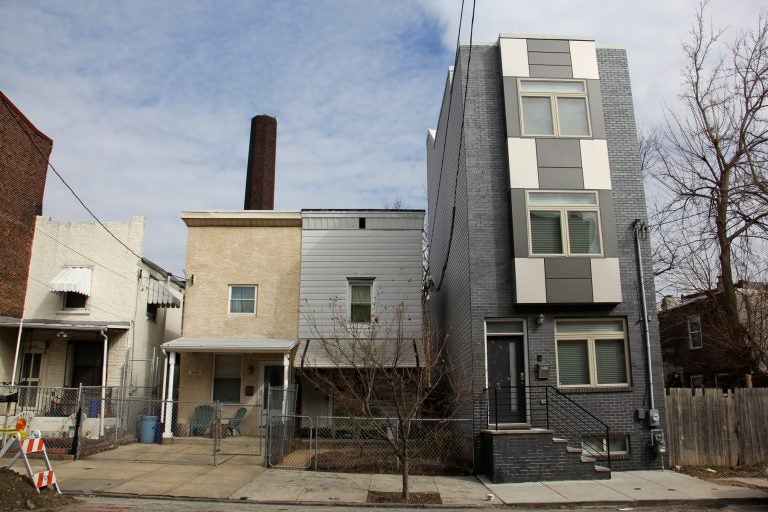Just one week after bay window ban advances, a duplex ban moves forward
Council President Darrell Clarke is moving forward with legislation aimed at limiting the development of apartment buildings in his North Philly district.

On York Street in East Kensington, a rowhome towers above its neighbors. (Emma Lee/WHYY)
This article originally appeared on PlanPhilly.
—
Philadelphia City Council President Darrell Clarke doesn’t want to see more apartments in the rowhouse neighborhoods that dominate his North Philadelphia district.
Over the past few months, he’s introduced several bills to limit their development. One would ban duplexes from the Jefferson Manor neighborhood near Temple University.
Another legally dubious effort to create “single-family preservation districts” would block the city’s zoning board from granting permission for multi-family housing in areas zoned for traditional one-household dwellings.
A final piece of legislation seeks to revise the zoning code that governs construction and development in the city.
The first of those bills quickly passed the City Council’s Rules Committee Wednesday morning, just one week after a Council committee approved Councilman Kenyatta Johnson’s ban on bay windows and balconies in certain sections of his South Philadelphia district. Both measures intend to restrain housing developers in areas experiencing growth and demographic shifts.
“We were just overwhelmed with what has come to be changing our neighborhood and finding that properties are being sold and divided into apartments,” said Wilhemina Blackwell, who has lived in the neighborhood for 47 years and spoke in support of Clarke’s measure. “We would like our area to remain single-family dwellings that are family owned.”
The significance of Clarke’s bill is largely symbolic. Almost all of the properties in the affected area are already zoned as single family and so a new ban on “two-family” dwellings is redundant. The bill would not prevent property owners from seeking variances for multi-family dwellings.
Clarke did not respond to requests for comment, but Blackwell and another North Philadelphia resident spoke in favor of the legislation during the hearing.
Clarke chose not to bring his proposed ban on multifamily variances to the Rules Committee on Wednesday. But on Tuesday, the City Planning Commission voted against recommending it for passage.
The bills are Clarke’s response to the Zoning Board of Adjustment’s permissive track record. Most of the time when developers and property owners seek variances of any kind, they are able to win them from the mayorally appointed board.
In Clarke’s district, which includes parts of Center City and a student-heavy area around Temple University, multi-family variances are rarely denied.
Zoning experts who were interviewed about the single-family preservation district bill questioned its constitutionality. Even those who strongly agree that the ZBA is too permissive argued that the bill did not hold up to scrutiny.
“The single-family preservation district bill is complete nonsense,” said Greg Pastore, a former member of the zoning board who often voted against granting variances when he thought property owners didn’t make a strong enough case.
“No matter what zoning code restrictions council makes, the ZBA has the legal authority to grant relief from them,” Pastore said. “When the U.S. Supreme Court upheld zoning codes way back when, it specifically said that appellate relief had to be available.”
While the legal precedent behind Clarke’s bill may be murky, its motivation is clear. Longtime homeowner groups form the backbone of Clarke’s constituency in his councilmanic district. Student housing has taken over many of the neighborhoods around Temple targeted by the duplex ban while further south long neglected rowhouse neighborhoods are seeing a sustained surge of reinvestment. As an influx of new residents moves in, these constituents have found themselves looking for ways to preserve their idea of the neighborhoods they’ve known.
“We would like to keep Jefferson Manor single family dwellings for the sake of preserving our long-lasting neighborhood,” said Carmen Calhoun, a Jefferson Manor resident, at the Rules Committee hearing. “We’ve always been single family and now people are coming in making them two or three family dwellings.”
Akira Drake Rodriguez, a postdoctoral fellow of city planning at the University of Pennsylvania, said that single-family homeowners often have disproportionate power to other residents, especially for politicians who are elected by narrowly defined geographic districts or wards. Even though the constituents who testified in favor of Clarke’s bill were all African American homeowners of modest means, Rodriguez argued that banning multi-family variances would still be counterproductive to larger goals of affordability and equity.
“I empathize with Councilman Clarke’s district, which has no doubt been disproportionately forced to accept land use designations that wealthier and whiter districts do not,” Rodriguez said in an email. “But the City has lost more affordable units and added more market-rate units, and banning multifamily (which often comes with affordable units) housing will only deepen these inequities.”
Both the duplex ban and the bay window ban could be passed by the full City Council as soon as next week.
WHYY is your source for fact-based, in-depth journalism and information. As a nonprofit organization, we rely on financial support from readers like you. Please give today.







